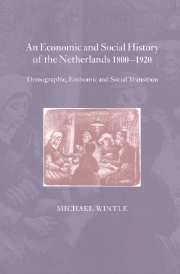 An Economic and Social History of the Netherlands, 1800–1920
An Economic and Social History of the Netherlands, 1800–1920 Book contents
- Frontmatter
- Contents
- List of plates
- List of figures
- List of tables
- Acknowledgements
- General introduction
- Part I Demography, and the health of the nation
- Part II Economic Transition
- Part III Social transition: state, society, individual and nation
- 9 Authority and representation: the citizen and the state
- 10 Education and welfare: empowerment and protection
- 11 Loyal subjects: state formation and nation formation
- 12 Social groups
- General conclusion
- Bibliography
- Index
9 - Authority and representation: the citizen and the state
Published online by Cambridge University Press: 13 August 2009
- Frontmatter
- Contents
- List of plates
- List of figures
- List of tables
- Acknowledgements
- General introduction
- Part I Demography, and the health of the nation
- Part II Economic Transition
- Part III Social transition: state, society, individual and nation
- 9 Authority and representation: the citizen and the state
- 10 Education and welfare: empowerment and protection
- 11 Loyal subjects: state formation and nation formation
- 12 Social groups
- General conclusion
- Bibliography
- Index
Summary
Introduction
Nowadays the Dutch are famous or even notorious for the particular kind of relationship they have evolved between themselves and their public bodies. They have an almost universal reputation for their ‘liberal’ regime or ‘liberal state’, with ‘liberal’ used here in the sense of tolerant, permissive, generous, humane, non-repressive. Is there any evidence in the nineteenth century of such ‘liberalism’ and tolerance? What was the Dutch official attitude to non-standard forms of behaviour and under-privileged groups?
In seeking out this historical process of defining the relationships between state, interest group and individual, three principal areas will be investigated in this chapter: the growth of democratic political institutions; the role of the liberals in that process; and finally the famed Dutch tolerance. Where did this ‘tolerance’ originate, and how did it develop? How was it manifested (if at all) in Dutch political and social institutions as they developed in the nineteenth century? This is a large subject area, and here we shall take certain specific aspects of it. We shall focus in turn on traditions of religious and political freedom interspersed with examples of intolerance, and finally and most importantly on that particularly Dutch brand of political tolerance, verzuiling.
Democratization
The Dutch were not in the vanguard of the evolution of the institutions of parliamentary democracy, in comparison to other European nations. In particular, the suffrage was expanded only very gradually in the nineteenth century.
- Type
- Chapter
- Information
- An Economic and Social History of the Netherlands, 1800–1920Demographic, Economic and Social Transition, pp. 252 - 266Publisher: Cambridge University PressPrint publication year: 2000
